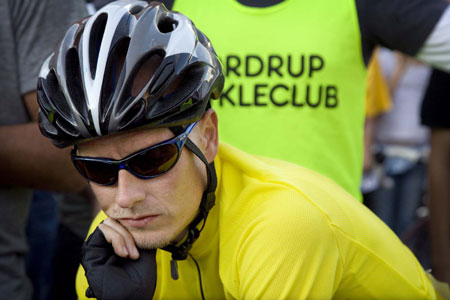Dane plays fool in 2007's biggest farce
(Agencies)
Updated: 2007-12-27 14:31
Updated: 2007-12-27 14:31
PARIS - They say Christmas is the time for pantomime. But in 2007, cycling provided a year-round drama which bordered on farce.
The backdrop to the entire show was the lingering suspicion over those implicated in the "Operation Puerto" doping affair in Spain, which, over the 18 months since it erupted in Spain, still seems nowhere near closure.
But even that scandal became just a supporting act as a skinny Dane wearing some familiar garb - a yellow jersey - attempted to join the "legends" of the sport by winning the Tour de France.
The doubts over who was clean and who was not were never far from anyone's mind, but still, during three weeks in July, the stage was set for another epic race as Alexandre Vinokourov, Alejando Valverde, Levi Leipheimer and Cadel Evans prepared to do battle in the Alps and Pyrenees.
Even before the real battles began, Vinokourov, a former runner-up, tested positive for blood doping - leading to the expulsion of his Astana team.
Meanwhile, Michael Rasmussen pulled off some amazing displays of climbing, took the race lead and threatened to go all the way to Paris with the fabled yellow jersey on his shoulders.
It was just too good to be true.
In the race's closing days it was revealed that Rasmussen had missed several random doping tests in the previous 18 months, throwing significant doubt on his claim to a throne which had been vacant until the start of the race due to the late confirmation of Floyd Landis' positive test following the 2006 edition.
Rasmussen claimed he had been training in Mexico when dope-testers failed to reach him at his home in Monaco, and that his previous missed tests were down to "administrative errors".
Eventually, he was sensationally ejected from the race by his Rabobank team when it emerged that, in fact, he had been in Italy prior to the Tour.
After deliberately misinforming the dope-testers as to his whereabouts, Rasmussen's excuses of "administrative errors" were virtually laughable, especially when he finally owned up in November citing personal reasons: "I lied to protect my private life. The problems were marital in nature."
The only positive thing to come out of that sorry episode is that - mainly because sponsors, teams and the sport's long-suffering fans are getting fed up with a steady stream of doping scandals - cycling appears less and less inclined to suffer fools gladly.
International Cycling Union (UCI) president Pat McQuaid has effectively ruled Rasmussen "persona non grata" in the sport.
"I don't think he (Rasmussen) has any place in cycling," said McQuaid. "How can we trust him? For me, a lie is no different from a positive doping test."
Some would argue Rasmussen is simply a victim of an entrenched system in a sport which, at a professional level, according to some experts, is bad for your health unless you have performance-enhancing drugs.
Cycling has had a drug problem for decades, but on the flip side the sport has led the way when it comes to pioneering tests for banned substances.
It took the Festina drugs scandal at the Tour de France in 1998 to reveal the true extent of what was then rampant abuse of the banned blood- booster EPO (erythropoietin).
That sorry episode led to the creation of the World Anti-Doping Agency (WADA), although it was not until 2001 that a test was pioneered, and accepted by the scientific community, for EPO.
The various scandals of 2007 have led to the launching of a 'biological passport', which the authorities hope to have in place by spring 2008, logistics permitting.
If successful, the far-reaching measure - which will register and track the biological parameters of all professional cyclists - could be cycling's savior.
In 2007, the vagaries of the 1990s peloton came back to haunt some well known "legends".
Facing revelations of a former team masseur at Telekom, former Tour-winner Bjarne Riis admitted he used EPO throughout his career, including during his 1996 triumph.
Another former Telekom rider, sprint great Erik Zabel, also admitted "dabbling" with EPO. He has now been stripped of the first of the record six consecutive green jerseys (for the points classification) he won in the race.
While there were plenty of negatives, there were also some promising highlights in 2007.
Cadel Evans' stirring performance and eventual runner-up place in the Tour and the emergence of British sprint sensation Mark Cavendish were among those which appeared to lend cycling some credibility.
|
|
|
||
|
||
|
|
|
|
